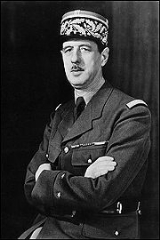
1940 Appeal of June 18 by Charles de Gaulle.
1944 World War II: Charles de Gaulle enters Paris.
1958 May 1958 crisis: a group of French military officers lead a coup in Algiers demanding that a government of national unity be formed with Charles de Gaulle at its head in order to defend French control of Algeria.
1958 Charles de Gaulle comes out of retirement to lead France by decree for six months.
1959 General Charles de Gaulle, President of France, declares in a speech in Strasbourg his vision for a "Europe, "from the Atlantic to the Urals."
1960 French forces crack down in a violent clash with protesters in French Algeria during a visit by French president Charles de Gaulle.
1961 In France a referendum supports Charles de Gaulle's policies in Algeria.
1962 French President Charles De Gaulle calls for Algeria to be granted independence.
1962 An attempt to assassinate French president Charles de Gaulle fails.
1963 The Elysée treaty of cooperation between France and Germany is signed by Charles de Gaulle and Konrad Adenauer.
1967 During an official state visit to Canada, French President Charles de Gaulle declares to a crowd of over 100,000 in Montreal: ''Vive le Québec libre!'' ("Long live free Quebec!"). The statement, interpreted as support for Quebec independence, delighted many Quebecers but angered the Canadian government and many English Canadians.
1968 Charles De Gaulle reappears publicly after his flight to Baden-Baden, Germany, and dissolves the French National Assembly by a radio appeal. Immediately after, less than one million of his supporters march on the Champs-Élysées in Paris. This is the turning point of May 1968 in France.
1969 Charles de Gaulle resigns as President of France.

